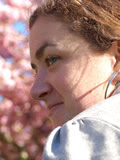Kathy Bonk, Communications Consortium Media Center, offered as a sidenote that she hitch-hiked in college and got involved in the Shirley Chisholm campaign! But that’s not what she’s talking about here. Snippets from her comments:
“What’s been very painful for me is that in the past 2 election cycles, the only ‘women’s issue’ that’s up for debate seems to be abortion. It wasn’t always that way. If we’re going to do anything for women, we need to move away from personality and back to issues.â€
“’Values voters’ is a code word for evangelicals. But I too am a values voter. We should shift the debate so that we look at feminists—and not just evangelicals—as values voters.â€
“We can’t loose ground on abortion. In Colorado, there’s a ‘personhood’ referendum on the ballot—meaning the antis are advocating that personhood starts with conception. But abortion issues can’t be all.â€
Note: Bonk was involved in spearheading a public opinion poll called “Moving Forwardâ€, which polled voters on their ideas for an agenda that’s not just about abortion but a broader range of issues. She’s got data, if anyone is interested in following up.









